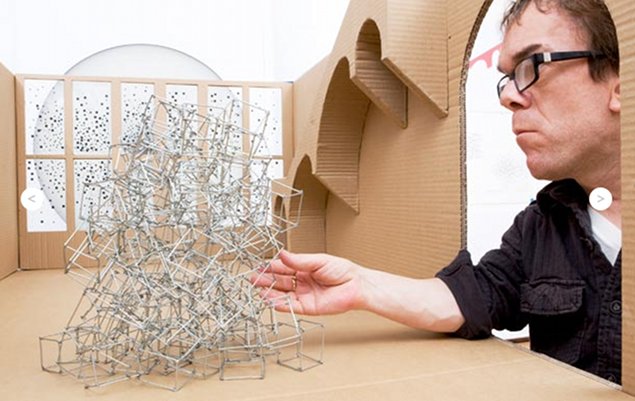What kind of object is Corban Walker’s Please Adjust?

Seeing Through Objects: a group discussion in the context of Corban Walker’s exhibition at the 2011 Venice Biennale. Organised by MA Art in the Contemporary World, National College of Art and Design, Dublin, Ireland and MA: Art and Process, Crawford College of Art & Design, Cork. Led by Francis Halsall, Lucy Dawe Lane and Declan Long.
Irish Pavilion, Venice Biennale, Saturday 4 June 2011
What kind of object is Corban Walker’s Please Adjust?
For the Irish Pavilion at the 54th Venice Biennale, Corban Walker has created a large-scale sculpture composed of 160 inter-connected open-framed stainless-steel cubes. As the exhibition statement describes, it is an art object in which many elements ‘combine to form a fragile structure that supports itself, though one alteration could destroy the existing configuration and create a new one’. Whilst appearing fixed, Please Adjust is also precarious, and though physically transparent it is, also, quite deliberately, not ‘clear’.
Using Please Adjust as a context, this discussion will explore multiple theoretical and historical approaches to definitions of, and encounters with, objects. What is at stake here is identifying the focus of aesthetic attention – in other words, how do theories of objects impact on the theories, practices and experiences of art?
The multiple, transient, performative and dematerialized forms that art objects have taken after modernism and since the late 1960’s demonstrate how the problems in defining what an object is are exemplified in the context of art. This historical moment is still with us. At the very least it is now taken for granted that an art object is not definable as a discrete, material thing that is independent from its situational and historical context(s).
However, relatively recent discussions of what Graham Harman has called both Object Orientated Philosophy and Speculative Realism offer the promise of ‘adjusting’ how objects are considered within contemporary art discourse. As Harman has claimed, “the dithering agnosticism of recent philosophy, its obsession with tedious questions of human access to the world, can be replaced by a high rolling metaphysics of objects. The spirit of the archive can be replaced by that of the casino”. (from Towards Speculative Realism, Zero Books, 2010). This means not only to address how art as a practice of object making constructs complex, relational objects but also how such objects might engender and demonstrate certain forms of thinking about the
world.
This discussion will build on the recent series of presentations on the subject of ‘What is an object?’ lead by the MA Art in the Contemporary World in response to Richard Tuttle’s exhibition Triumphs at the Hugh Lane Gallery in Spring 2011. It also follows from a previous MA ACW session at the Irish Pavilion at Venice in 2009.
All are welcome to attend this discussion. Please get in touch if you would like to participate.
Contact: Francis Halsall (halsallf@ncad.ie); Lucy Dawe Lane (lucy.dawe-lane@cit.ie); Declan Long (longd@ncad.ie; twitter: @declanlong).
We would like to gratefully acknowledge the support and assistance of Corban Walker, Eamon Maxwell, and Jennifer Marshall in the staging of this event. The Irish Pavilion at Venice is located at the Istituto Santa Maria della Pietà, 3703 Calle della Pietà, Castello. Calle della Pietà is mid-way between Piazza San Marco and the Arsenale, off Via Riva degli Schiavoni. http://www.acw.ie <http://www.acw.ie/> ; http://media.cit.ie/maap/; http://www.irelandvenice.ie/
Castello 3701, Calle della Pietà
30122 Venezia

